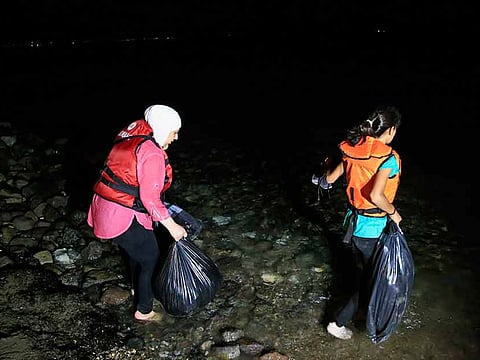Everything is left behind by the desperate migrants
There are 16 newly or recently born children at the hospital in Bodrum, left behind by their desperate mothers

Kos, Greece: The desperate leave everything behind. There are 16 newly or recently born children at the hospital in Bodrum, Turkey. They have been left behind, their mothers making a desperate choice. Who knows if the women made it across the five kilometres separating Turkey from Greece and the European Union. Who knows where they are. And who could ever know what it’s like to make a choice like that.
The people smugglers charge 500 euros for a place on a boat. A heavily pregnant woman? Who knows.
On Friday morning, 600 made it across to Kos and three other smaller Greek islands nearby. One body was pulled from the sea. And many more arrived on Saturday.
When Gulf News crossed over, the sea was relatively calm with a swell of less than a metre, though a stiff wind was enough to force tourists on the Greek ferry hang on to their hats and hold down their dresses.
Yes, there was a plan for Gulf News to cross with the migrants. But another 500 euros to a Dutch human smuggler can’t be justified. Besides, it just didn’t feel safe.
The harbour in Kos is lined with hundreds of discarded life jackets, making almost a colourful collage against the base of the 17th century fort that dominates the town’s seafront. If it weren’t so sad, the modern art piece would be beautiful.
For every life jacket, 500 euros into a smuggler’s pocket.
A group of newly arrived Syrian refugees sit by the fort wall, gathering their thoughts, resting their bodies, steeling themselves for what comes next for their bit part in the greatest migration crisis since the end of the Second World War.
According to Frontex, the European border agency, 50,000 have made it to the Greek islands so far this summer. And there’s no end in sight.
A portly short middle-aged policeman has had enough of his bit part in the migration crisis and is shouting at the dozen or so Syrian men, women and three children.
“Move into town,” he yells. “Go into the town centre. Move.”
“Tamam,” [OK] a middle-aged Syrian answers.
“No tamam,” the policeman shouts, showing that there’s little love lost between Greece and Turkey. “Tamam in Turkey. This is Greece. No tamam. It’s etaxsi. OK,” The desperate leave everything behind, even their language.
“And take your rubbish with you,” the officer shouts. “Look at this filth.”
“My wife. Hospital,” another of the group tries to reason with a few words of English to explain his family’s plight.
“No hospital,” the officer says. “Go to town centre. Move.”
Yes, the desperate leave everything behind, even their right to respect.
“Take your filth,” he says, kicking an empty water bottle at the group.
An elderly British couple are walking the quayside, taking in the events, holiday memories they’ll be able to share with friends in Salford.
“It’s terrible. They’ll be coming to Britain next,” the lady says with a disgust that somehow these refugees might contaminate their life in Salford.
“We should put up a fence and keep them out,” he offers. “What’s the solution. There is no other way.”
A little girl, no older than four, plays in the life jackets, finding a blow-up purple plastic ring that should be on the beach or at a swimming pool.
“Maryam, la,” her mother shouts. Leave it be.
The desperate leave their toys behind, and the innocence of childhood too.
“Damascus,” the mother tells Gulf News in Arabic. “Germany.”
She points to a large raft that is floating next to a Greek Coast Guard cutter in the harbour. That’s how they made it across, mother and daughter. There’s no one else with them, no bags, no belongings, nobody.
At the town centre, in a small park that offers some shade in the summer sun, there are hundreds of refugees. They lie on cardboard, on grass, on benches.
An ambulance offers basic help, and there’s a couple of women in bright vests handing out bottles of water and some bread rolls.
Greek authorities say that they are overwhelmed by the sheer numbers. Last Wednesday, it chartered a ferry to take 3,000 to the mainland. Another will likely follow this week. And with thousands more migrants in Bodrum waiting to cross over — with hundreds arriving there daily, there will be more ferries to be chartered.
And more babies to be left at the hospital in Bodrum too.



